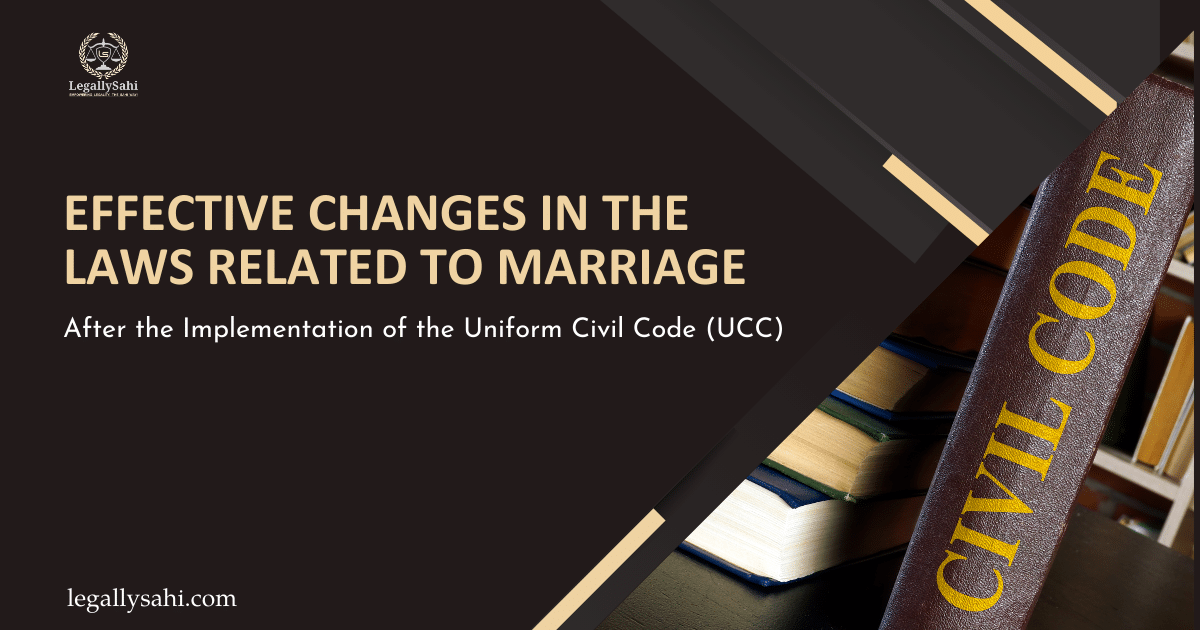Introduction
The implementation of the Uniform Civil Code (UCC) in India marks a significant transformation in the country’s legal landscape. The UCC aims to replace the fragmented personal laws governing marriage, divorce, inheritance, and adoption with a single set of laws applicable to all citizens, regardless of their religion. This article delves into the effective changes in the laws related to marriage following the implementation of the UCC, exploring its implications on various aspects of matrimonial law.
Historical Context of Personal Laws in India
India’s legal system has historically been a mosaic of personal laws based on religious traditions. Hindu, Muslim, Christian, and other religious communities have had distinct legal frameworks governing marriage and related issues. The British colonial administration retained these personal laws to ensure social stability. However, post-independence India has grappled with the complexities and inequalities arising from this legal plurality.
Objectives and Rationale Behind the UCC
The primary objective of the UCC is to provide a uniform set of laws that ensure equality, justice, and secularism. The Indian Constitution, under Article 44, envisions the implementation of a UCC to promote national integration and gender justice. The rationale behind the UCC includes:
- Gender Equality: Addressing the gender biases inherent in various personal laws.
- National Integration: Promoting a sense of unity by treating all citizens equally under a single legal framework.
- Simplification of Laws: Reducing the complexity and confusion arising from multiple personal laws.
Key Changes in Marriage Laws Under the UCC
- Uniform Age of Marriage:
- Pre-UCC: Different personal laws prescribe varying ages for marriage. For instance, under the Hindu Marriage Act, the legal age for marriage is 18 for women and 21 for men, while under Muslim personal law, the age of marriage is determined by puberty.
- Post-UCC: The UCC establishes a uniform minimum age of marriage at 21 for both men and women, ensuring gender parity and protecting minors from early marriages.
- Registration of Marriages:
- Pre-UCC: Marriage registration is not mandatory across all personal laws. This often leads to disputes and lack of legal evidence in cases of marital conflicts.
- Post-UCC: The UCC mandates the compulsory registration of all marriages, providing legal recognition and documentation, thereby reducing disputes and safeguarding the rights of spouses.
- Monogamy:
- Pre-UCC: Some personal laws, such as Muslim personal law, allow polygamy. For instance, Muslim men can have up to four wives.
- Post-UCC: The UCC enforces monogamy for all citizens, regardless of their religion, ensuring equality and protecting the rights of women.
- Consent and Free Will:
- Pre-UCC: In certain personal laws, the consent of the bride may not be explicitly required, or child marriages may be permitted under certain conditions.
- Post-UCC: The UCC emphasizes the importance of free and informed consent of both parties entering into marriage, and explicitly prohibits child marriages.
- Divorce and Separation:
- Pre-UCC: Divorce laws vary widely across different religions, with some personal laws placing women at a disadvantage. For instance, under certain interpretations of Islamic law, a man can divorce his wife unilaterally through “triple talaq.”
- Post-UCC: The UCC provides a uniform procedure for divorce, ensuring that both parties have equal rights and opportunities to seek divorce. It eliminates unilateral divorce practices and emphasizes mutual consent and judicial oversight.
- Maintenance and Alimony:
- Pre-UCC: Provisions for maintenance and alimony differ across personal laws, often leading to inadequate support for divorced women.
- Post-UCC: The UCC establishes standardized guidelines for maintenance and alimony, ensuring fair and adequate support for spouses based on principles of justice and equality.
Implications for Different Communities
The implementation of the UCC has far-reaching implications for various religious and cultural communities in India. While it aims to promote equality and secularism, it also poses challenges and concerns:
- Hindus:
- The Hindu community, governed primarily by the Hindu Marriage Act, 1955, may experience relatively fewer changes. However, the emphasis on compulsory registration and uniform divorce procedures will streamline and strengthen legal protections.
- The Hindu community, governed primarily by the Hindu Marriage Act, 1955, may experience relatively fewer changes. However, the emphasis on compulsory registration and uniform divorce procedures will streamline and strengthen legal protections.
- Muslims:
- The Muslim community faces significant changes, especially concerning polygamy, unilateral divorce (triple talaq), and the age of marriage. These changes aim to align with the principles of gender justice and equality, though they may encounter resistance due to deeply entrenched cultural and religious practices.
- The Muslim community faces significant changes, especially concerning polygamy, unilateral divorce (triple talaq), and the age of marriage. These changes aim to align with the principles of gender justice and equality, though they may encounter resistance due to deeply entrenched cultural and religious practices.
- Christians:
- The Christian community, governed by the Indian Christian Marriage Act, 1872, and the Indian Divorce Act, 1869, will benefit from uniformity in divorce procedures and maintenance provisions, promoting fairness and reducing legal ambiguities.
- The Christian community, governed by the Indian Christian Marriage Act, 1872, and the Indian Divorce Act, 1869, will benefit from uniformity in divorce procedures and maintenance provisions, promoting fairness and reducing legal ambiguities.
- Parsis:
- The Parsi community, governed by the Parsi Marriage and Divorce Act, 1936, will also experience changes, particularly in the areas of divorce and maintenance, ensuring consistency with the principles of the UCC.
- The Parsi community, governed by the Parsi Marriage and Divorce Act, 1936, will also experience changes, particularly in the areas of divorce and maintenance, ensuring consistency with the principles of the UCC.
- Other Communities:
- Smaller religious and tribal communities, with their unique customs and traditions, will need to navigate the transition to the UCC. While the UCC aims to respect cultural diversity, it also emphasizes the need for uniform legal standards to protect individual rights.
- Smaller religious and tribal communities, with their unique customs and traditions, will need to navigate the transition to the UCC. While the UCC aims to respect cultural diversity, it also emphasizes the need for uniform legal standards to protect individual rights.
Challenges and Criticisms
The implementation of the UCC is not without challenges and criticisms:
- Resistance from Religious Groups:
- Various religious groups may resist changes perceived as infringing on their religious and cultural practices. Building consensus and addressing concerns through dialogue and consultation is crucial.
- Various religious groups may resist changes perceived as infringing on their religious and cultural practices. Building consensus and addressing concerns through dialogue and consultation is crucial.
- Balancing Uniformity and Diversity:
- Striking a balance between uniform legal standards and respecting India’s cultural and religious diversity is a complex task. Ensuring that the UCC accommodates diversity while promoting equality and justice is essential.
- Striking a balance between uniform legal standards and respecting India’s cultural and religious diversity is a complex task. Ensuring that the UCC accommodates diversity while promoting equality and justice is essential.
- Implementation and Enforcement:
- Effective implementation and enforcement of the UCC require robust legal and administrative mechanisms. Training legal professionals, creating awareness, and establishing efficient systems for marriage registration and dispute resolution are critical.
- Effective implementation and enforcement of the UCC require robust legal and administrative mechanisms. Training legal professionals, creating awareness, and establishing efficient systems for marriage registration and dispute resolution are critical.
- Gender Justice and Social Change:
- Achieving gender justice through the UCC necessitates broader social change and awareness. Addressing deep-seated patriarchal attitudes and empowering women through education and socio-economic opportunities is vital.
- Achieving gender justice through the UCC necessitates broader social change and awareness. Addressing deep-seated patriarchal attitudes and empowering women through education and socio-economic opportunities is vital.
Conclusion
The implementation of the Uniform Civil Code marks a transformative step towards achieving equality, justice, and secularism in India’s legal system. By addressing the disparities and biases inherent in personal laws, the UCC aims to create a cohesive and fair legal framework for marriage and related issues. While the transition may pose challenges and resistance, the ultimate goal is to ensure that every citizen, regardless of their religion, enjoys equal rights and protections under the law. The UCC represents a significant stride towards a more just and unified India, where individual rights and gender justice are paramount.
For more insights and professional legal advice, visit Legally Sahi, your trusted partner in navigating the complexities of the legal system.





